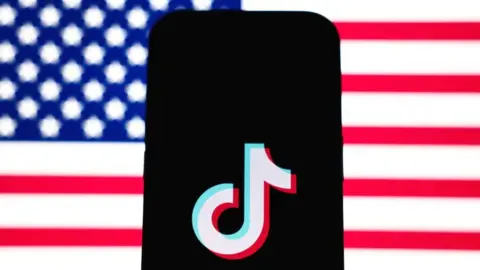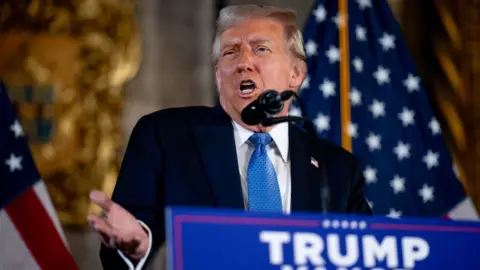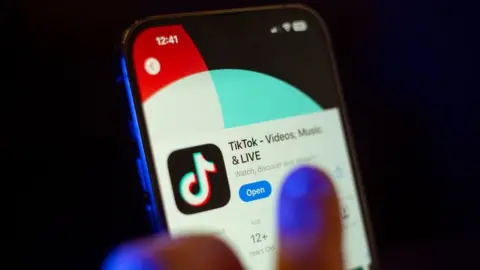When could TikTok be banned and will Trump save it?
 Getty Images
Getty ImagesSocial media company TikTok faces a ban in the US unless it is sold by its Chinese parent company ByteDance by 19 January.
The Supreme Court, the country's highest judicial authority, has heard a final plea by TikTok for the ban to be overturned.
President-elect Donald Trump - who takes office the day after the ban is to come into force - has asked the Supreme Court to delay it so he can seek a "political" solution.
Who wants to ban TikTok in the US and why?
US officials and lawmakers have accused ByteDance of being linked to the Chinese government.
Many have cited national security concerns over the app, claiming that it could be forced by Beijing to hand over data about its 170 million US users.
The US Justice Department has said that because of its Chinese parent company, and access to data on American users, TikTok poses "a national-security threat of immense depth and scale".
In April 2024, US Congress passed a bill, which President Joe Biden signed into law, giving ByteDance nine months to find a US-approved buyer or see TikTok shut down across the US.
TikTok and ByteDance deny being linked to the Chinese government, or that any data would be handed over. They have also previously ruled out a sale.
The firms have filed multiple legal challenges against the law, saying it is "unconstitutional" and would have a "staggering" impact on free speech by censoring its US users.
They have said that even a temporary ban in early 2025 would have "devastating effects" on their operations and users.
Could Donald Trump stop TikTok's ban?
Donald Trump's victory in the 2024 election may offer TikTok a lifeline.
He tried to ban the app while he was in the White House in 2020, but has now called on the US Supreme Court to delay the ban while he works on a "political resolution".
 Getty Images
Getty ImagesAhead of the hearing, his lawyer filed a legal brief saying that Trump "opposes banning TikTok" and intends to resolve the issues "through political means once he takes office".
Trump's meeting with TikTok's boss Shou Zi Chew in December also increased hopes among the law's opponents that he would intervene.
The Supreme Court heard TikTok and Bytedance's arguments against the law on 10 January - and is now deciding whether to overturn the lower court's ruling.
Its decision is expected in the coming days.
If the law is upheld, it is unclear what Trump would do to prevent the app going offline. To repeal it would require a new law, backed by a majority of both houses of Congress.
A lawyer representing TikTok and ByteDance told the Supreme Court that if the ban goes ahead, it would "go dark" in the US on 19 January.
How would a TikTok ban work?
Online marketplaces, such as app stores, and some web hosting services will have to stop making TikTok available to Americans if its ban goes ahead, according to the law.
But this doesn't mean the TikTok app will disappear from your phone.
 Getty Images
Getty ImagesPoliticians have told Apple and Google's bosses to be ready to pull TikTok from the App Store and Google Play store for iOS and Android devices.
Most people download apps onto their smartphones and tablets through app stores, so the ban would stop new users from getting TikTok.
It also would mean that people who have already downloaded the app would no longer be able to get future updates designed to improve security or fix bugs, likely rendering it unusable over time.
The law forbids applications controlled by US adversary countries from being distributed, updated and maintained in the US.
It seemingly wouldn't penalise citizens if they find a way to keep using TikTok despite a ban.
Instead, the law says those found to be violating it by making an app available in the US could face large fines of up to $5,000 per user determined to have accessed it.
The law gives broad powers to the president to limit apps with ties not only to China but also Russia, Iran and North Korea.
What data does TikTok collect?
At the heart of TikTok is its algorithm - a set of instructions that determine the content displayed to users, based on data about how they engaged with other material.
TikTok can use this data, as well as information about an individual user's device, location and keystroke rhythms, to recommend videos to users on its automatically generated For You feed.
Some researchers have previously claimed the app collects more data from users than others in order to power its highly personalised system.
However, rival social media platforms such as Facebook and Instagram collect similar user data.
Is TikTok banned in other countries?
TikTok is already banned in India, which was one of the app's largest markets before it was outlawed there in June 2020.
The authorities in Iran, Nepal, Afghanistan and Somalia have also previously imposed bans on the app.
The UK government and Parliament banned TikTok from staff work devices in 2023, as has the European Commission.
The BBC also advised staff to delete TikTok from corporate phones because of security fears.
